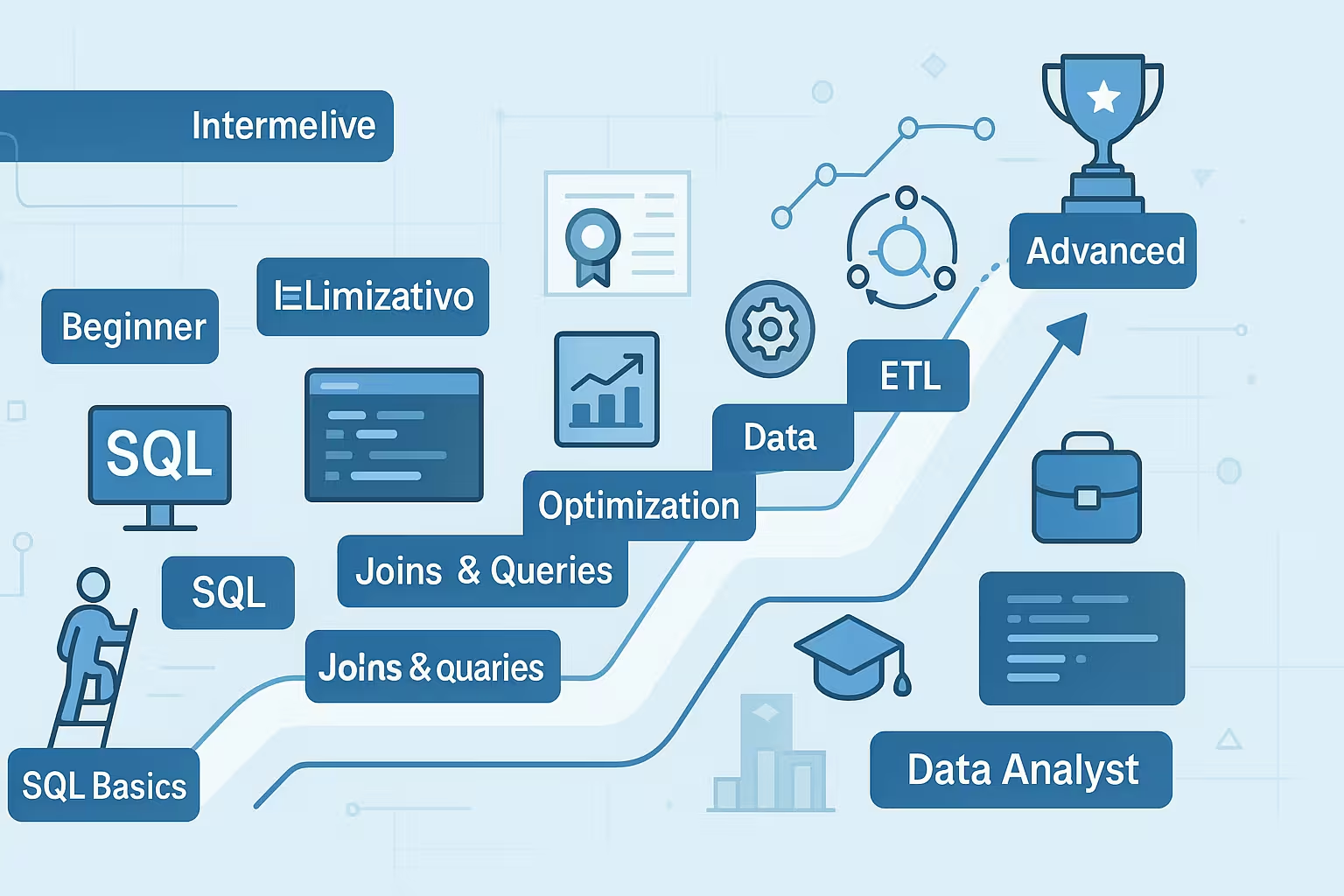Structured Query Language (SQL) is a foundational technology that underpins nearly every data-related role across industries. Whether you’re building applications, analyzing data, managing databases, or architecting cloud data platforms, SQL is your critical tool. In this final chapter, we’ll bring everything together and chart a long-term path for becoming a proficient and in-demand SQL professional.

Table of Contents
This guide includes:
- Career paths that use SQL
- Skills roadmap from beginner to expert
- Tools and technologies you should master
- Certification and learning platforms
- Resume and project tips
- Interview prep guide
- Real-world role expectations
SQL-Centric Career Paths
SQL isn’t just for DBAs or analysts. It touches many roles:
| Career Role | How SQL Is Used |
|---|---|
| Data Analyst | Analyze trends, reports, aggregations |
| Business Intelligence | Dashboards, KPIs, reporting layers |
| Database Administrator | Backup, tuning, user control, maintenance |
| Backend Developer | CRUD operations, schema design, migrations |
| Data Engineer | ETL pipelines, data warehousing, transformation |
| Data Scientist | Data preparation, exploratory analysis |
| DevOps / SRE | Monitor query health, replication |
| Product Analyst / PM | Metrics reporting, SQL ad-hoc queries |
SQL Learning Roadmap (Beginner to Advanced)
Level 1 – Foundations (Beginner)
- Understanding RDBMS and Tables
- Data Types and Constraints
- Basic Queries: SELECT, WHERE, ORDER BY
- Filtering with logical operators (AND, OR, IN, NOT, BETWEEN)
- Sorting and Limiting
Level 2 – Intermediate Skills
- Aggregations: COUNT, SUM, AVG, GROUP BY, HAVING
- Subqueries and Nested SELECT
- JOINs (INNER, LEFT, RIGHT, FULL)
- CRUD operations: INSERT, UPDATE, DELETE
- CASE, COALESCE, IFNULL
Level 3 – Database Schema Management
- CREATE, ALTER, DROP (Tables, Views, Indexes)
- Constraints: PRIMARY, FOREIGN, UNIQUE, CHECK
- Transactions: BEGIN, COMMIT, ROLLBACK, SAVEPOINT
- Normalization and Schema Design Principles
Level 4 – Advanced Querying
- Window Functions: ROW_NUMBER, RANK, LAG, LEAD
- CTEs (WITH)
- Set operations: UNION, INTERSECT, EXCEPT
- Materialized Views
- Performance Tuning: Indexing, EXPLAIN, Optimizer
🔹 Level 5 – Real-World Integration
- Connecting SQL with Python, Java, and APIs
- Using SQL in data dashboards (e.g., Power BI, Tableau)
- Writing Stored Procedures and Triggers
- Working with cloud data warehouses (Snowflake, BigQuery)
- SQL in CI/CD pipelines for migrations
Essential Tools and Platforms
Familiarity with SQL alone is powerful, but coupling it with tools multiplies your impact.
Databases
- PostgreSQL
- MySQL / MariaDB
- SQL Server
- Oracle
- SQLite (lightweight, great for prototyping)
IDEs & Clients
- DBeaver, pgAdmin, SQL Workbench
- Azure Data Studio
- DataGrip (JetBrains)
- Jupyter (via Python + SQLite/MySQL connector)
Analytics Tools
- Power BI, Tableau, Looker, Redash, Metabase
ETL & Data Pipelines
- dbt (Data Build Tool)
- Apache Airflow
- Talend / Informatica / Pentaho
Version Control + DevOps
- Git for SQL scripts
- Flyway / Liquibase for schema migrations
- Docker for containerized DBs (great for learning!)
SQL Certifications
Certifications can validate your expertise and help in job searches.
Popular Certifications:
- Microsoft Azure DP-900: Data Fundamentals
- Google Cloud Professional Data Engineer
- IBM Data Analyst Certificate (Coursera)
- Oracle Certified SQL Associate
- Snowflake SnowPro Core Certification
Certifications are best complemented with real project experience.
Resume and Project Tips
What to Include:
- SQL Projects: dashboards, data pipelines, reporting queries
- Database Design Samples (schema screenshots or ERDs)
- Performance tuning stories (before vs after execution time)
- Metrics: “Reduced dashboard load time by 70% using indexing”
Portfolio Project Ideas:
- Build an E-commerce DB schema and report daily revenue
- Create a job application tracker using SQL
- Analyze a public dataset (e.g., IMDb, World Bank)
- Create a BI dashboard using SQL + Power BI
Use GitHub or a blog to showcase your queries and learning.
SQL Interview Prep Guide
Key Question Categories:
- Basic SQL – SELECT, filtering, aggregations
- Joins and Grouping – Understanding INNER/OUTER joins
- Subqueries and CTEs – Nested logic
- Window Functions – Ranking, partitioning
- Schema Design – Normal forms, indexing
- Optimization – Use of EXPLAIN, indexing logic
- Behavioral – “Tell us about a project where SQL made an impact”
Example Questions:
-- Find the second highest salary
SELECT MAX(Salary) FROM Employees
WHERE Salary < (SELECT MAX(Salary) FROM Employees);
-- Customers with no orders
SELECT * FROM Customers c
WHERE NOT EXISTS (
SELECT 1 FROM Orders o WHERE o.CustomerID = c.CustomerID
);
Code language: HTML, XML (xml)Practice on platforms like:
- LeetCode (Database section)
- StrataScratch
- Hackerrank SQL Track
Real-World Expectations for SQL Roles
Entry-Level Analyst
- Build ad-hoc queries
- Clean data using SQL filters and joins
- Create simple reports and dashboards
Mid-Level Analyst or Engineer
- Optimize slow queries
- Write intermediate SQL with CTEs, GROUP BY, CASE
- Maintain automated report pipelines
Senior Data Engineer / DBA
- Architect schemas
- Implement ETL processes in SQL
- Automate backup, monitoring, and indexing
- Design for scale (partitioning, load balancing)
SQL in Remote and Freelance Work
SQL is highly remote-friendly, especially for roles involving:
- BI reporting and dashboard creation
- ETL and data cleaning
- Marketing and product analytics
Platforms to find SQL gigs:
- Upwork
- Toptal
- Freelancer
- RemoteOK
Structured Learning Plan
Month 1–2: Fundamentals
- SELECT, WHERE, GROUP BY
- JOINs, subqueries
- CRUD operations
Month 3–4: Intermediate Projects
- Schema design project
- Dashboard project (SQL + BI tool)
- Start GitHub portfolio
Month 5: Advanced SQL + Optimization
- Window functions
- Indexing and tuning
- Transactions and isolation levels
Month 6: Real-world prep
- SQL interview prep (50+ questions)
- Project case study writeups
- Apply to internships or freelance gigs
Final Thoughts
SQL is one of the most enduring and in-demand skills in tech. Whether you’re a coder, analyst, scientist, or manager, the ability to speak SQL fluently opens doors across industries.
SQL is:
- Timeless – Decades old, still thriving
- Universal – Works with all programming languages
- Powerful – Handles everything from simple lookups to complex pipelines
- Rewarding – Clear output, high impact
Treat SQL as more than a query tool — treat it as a career asset.
Congratulations on reaching the final chapter. Whether you’re just starting or deepening your SQL journey, keep building, querying, optimizing — and above all, learning.
You’re now equipped to thrive in the world of SQL.
